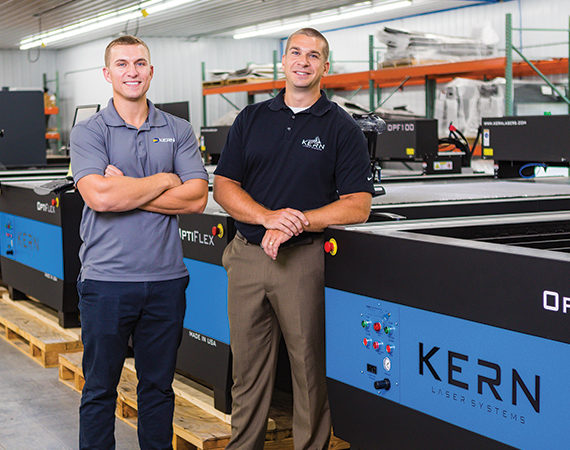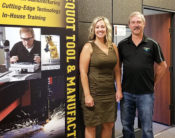From their headquarters in rural Wadena, Kern Laser Systems and Kern Technologies are family businesses that have partnered with national players as large as Lockheed Martin, Boeing, NASA, and the U.S. military. They even have an international presence in Australia, the United Arab Emirates, and Japan.
“We have a machine in every continent besides Antarctica,” Derek Kern, president and CEO of Kern Laser Systems, says.
Not bad for a “bunch of farm boys,” says Derek’s brother, Aaron Kern, president and CEO of Kern Technologies.
Today, the pair of cutting-edge, laser tech companies have a combined revenue of $15 million and sell to manufacturers of high-end consumer electronics, electronic signage, and aviation equipment. Such an outcome may have seemed unlikely in 1982. A father of four and respected professor of electronics and telecommunications at Wadena Vocational Technical College, Gerald Kern was an entrepreneur possessed by an endless curiosity for tinkering and invention. His company began in the family garage. Through experimentation, Gerald developed a motorized X/Y gantry system and imagined agricultural applications, among others, for his new product.
But with plenty on his plate already, it took no small amount of grit to keep moving forward.
“On his lunch break, he would run to the shop, do sales calls, check on the guys—all while trying to raise a family,” Derek remembers. “When he built the company up to a certain degree, he quit teaching and invested all his time in the business.”
Lightning struck, however, following Gerald’s introduction to the late Peter Laakmann—a pioneer of CO2 laser technology. Pairing one of Laakmann’s Synrad-branded lasers to a Kern motorized gantry, Gerald had stumbled onto an idea with potential. Though still an early prototype, the product would be refined and eventually capable of computerized cutting and engraving, much like the products the company now sells nearly 40 years later.
The epiphany marked the birth of Kern Laser Systems.
In 2019, the Kern brand exists as both Kern Laser Systems and Kern Technologies, run by two of Gerald’s sons. For brothers Derek and Aaron Kern, involvement in the family business came at a young age. The pair remember clearly their father’s home-based laser experiments and the warning light on the family garage during working hours that told them the space was off-limits.
After graduating from high school some years apart, each brother moved away for college—Derek to Fargo’s North Dakota State University, and Aaron to the University of Minnesota, Minneapolis.
Today, both admit they anticipated returning home post-college to family and friends, but the “why” and “when” couldn’t have been predicted.
“I don’t know if I always knew that I would be back with the company the Monday after I graduated,” Derek explains. “I always thought I’d go somewhere for a year or two first, but it just never happened.”
Armed with a degree in management information systems, Derek found himself taking over Kern Laser Systems’ website. His involvement ramped up quickly. As Gerald sought to transfer leadership of the business, Derek proved himself to his father by taking on the weight. Around 2010, he was named president and CEO.
“I think the biggest challenge was just the stage we were at, as far as growth. We were growing really fast, and my dad—he was more of an inventor—didn’t want to grow the company; it wasn’t something that really appealed to him,” Derek says. “My first months at the helm, going to trade shows, setting up distributors internationally, was all brand new to me.”
Aaron returned in 2014, just one year after a second company, Kern Technologies, was formed to handle the R&D behind the in-house laser systems Gerald began designing in 2005. Fresh out of college himself, Aaron describes the whirlwind process of taking over that young company as a considerable test of his aptitude, as well as a lesson in humility. It’s a task, he says, which could never have been accomplished without the aid of experienced, veteran employees at both companies who were gifted with the patience to teach and the willingness to work together as a team.
“If I had any questions, I could talk to Derek or other managers,” Aaron remembers. “It was just me over there for a lot of the different departments, but I still had people with experience that helped guide me along too.”
Too Busy to Bicker
When questioned about adversity faced over the last 11 years, Derek says that perhaps the greatest challenge was working alongside family. While their father continued to oversee research and development, their mother, Ivy, served as the company’s accountant; her eye for thrift partly helped the company survive the last recession.
Not all of Kern’s competitors were so fortunate.
Meanwhile, their sister manages accounts payable, and two of Derek’s brothers-in-law work within the businesses. In the wrong family, it could be a recipe for disaster.
“There’s definitely a challenge there. The nice part about our company is we stay busy enough where we don’t really have time to bicker,” Derek says with a smile.
Growth, too, has proven an obstacle to surmount. While Gerald has from the beginning focused on R&D, Derek says it was apparent after the recession that their company needed to grow to thrive. With only limited training to prepare him, the young CEO jumped head-first into expanded marketing and international distribution.
Trade shows, though costly to attend, became a secret weapon for the Kern businesses. Derek says the return on that investment has been well worth the cost. Thanks in part to their father’s reputation for treating customers and coworkers with respect, Kern Laser Systems and Kern Technologies have become a staple and well-regarded feature of trade shows across the country. These include Photonics West, FABTECH, and the International Manufacturing Technology Show, among others.
“They definitely pay off,” Derek says.
Employee Culture
The companies so far haven’t struggled with the worker shortage that plagues many other manufacturers.
For one, the Kern companies are high-tech businesses in a rural setting. This seeming paradox brings with it several advantages for employee retention—such as, the natural scenery and ready access to prime hunting and fishing without leaving home.
“What I often find is people want to work with technology, but they’d have to move to the Cities to do it. There are not a lot of chances for someone to stay here, enjoy all the outdoor activities that are around here, and still work for a technology company,” Derek says.
“And a lot of those people who have those hobbies, they’re really good candidates,” Aaron interjects.
Part of it may also come down to a reputation for fairness at all levels of business.
“We’ve always had a good reputation; our dad just took care of customers,” Derek says.
That same practice extends to employees. Today, despite the separate buildings and branding, Kern Laser Systems and Kern Technologies exist as one big family, with regular picnics and special events to recognize their hard-working staff for top-shelf work.
On maintaining a positive workforce culture, Derek says, “It’s everything. All it takes is one person. That’s why we do a lot of things with our employees.”
Both brothers say they work hard to monitor workplace morale—intervening as needed, while avoiding micro- and drive-by management styles. And to this pair of company presidents, business success is all about finding the right people and treating them well.
Just as important, Derek says, is remembering that the smartest employers hire people smarter than themselves.
At Kern, many of those smarter people were former students and even fellow teachers of Gerald’s from his time as a professor. Curriculum at the local tech college has changed over the decades, however, and nearby Alexandria Technical College and its mechatronics program have helped fill what gap remains. Where skilled candidates are lacking, Aaron says the team has had regular success through word-of-mouth advertising, sourcing anyone with an interest in electrical and mechanical tinkering and then training them for the positions on offer.
Attributing their low turnover to competitive wages and strong morale, Derek and Aaron have seen a company culture emerge that inspires workers to invest their time and be compensated for it through regular opportunities for advancement.
“Treat your employees well, recognize them for their good work, and compensate them for that,” Aaron says.
Endless Possibilities
Having weathered the storm of last decade’s recession, both Kern Laser Systems and Kern Technologies have emerged stronger and more committed from the experience. Today, Derek views the future with unrestrained optimism.
“The thing about a laser is its endless possibilities. One day our salesmen are working with NASA, and the next day they’re working with a ‘ma and pa’ shop. One day we’re selling to a monument company, and the next day we’re selling a FiberCELL to a Fortune 500 company that’s just cutting metal parts.”
With Kern Laser Systems using lasers designed and built by Kern Technologies exclusively in their product line—with the exception of their FiberCELL product—there is limitless potential that benefits both companies. But growth continues to bring new puzzles to solve, and in 2019, the focus is on Enterprise Resource Planning (ERP) software to advance efficiency before manufacturing capacity reaches its limits. For that reason, both companies will be rolling out new ERP software on January 1, 2020.
It’s a process which may take multiple phases and several years to complete, but both CEOs see it as the next step in growing the 40-plus employee businesses their father started from the family garage in 1982.
…
Featured in the Fall 2019 issue of Enterprise Minnesota Magazine.

